
The world of AI writing tools has completely blown up. A new one seems to launch every week, promising to solve all your content problems in a snap. Trying to find the right one can feel like a full-time job in itself. Are you trying to brainstorm ad copy, draft long articles, or write important business messages? It's easy to get overwhelmed by the options.
That’s why we put this guide together. We’ve gone through the top contenders to help you find the best AI for writing, whether you’re a marketer, business owner, or support team lead. We'll get into the features, pricing, and who each tool is really for, so you can spend less time searching and more time writing.
What defines the best AI for writing tool?
Basically, an AI writing tool is software that uses large language models (like the ones from OpenAI or Anthropic) to help you write, rewrite, or clean up text. You can think of it as a very sophisticated version of the predictive text on your phone. These models have been trained on huge amounts of text from books, articles, and websites, which helps them understand context, grammar, and style. When you give them a prompt, they predict the most likely sequence of words to create a sensible response.
But they're not all the same. There's a big difference between a general-purpose tool like ChatGPT, which can do a little bit of everything, and a tool built for a specific job. Some are made for crafting marketing copy, while others, like eesel AI, are designed to plug directly into your business software to draft things like customer support replies using your company's own knowledge.
How we chose the best AI tools for writing
To give you a useful list, we looked at each tool using the same set of criteria. We wanted our recommendations to be based on how they actually perform, not just what their marketing says. Here’s what we paid attention to:
- Quality & Accuracy: Does the text it generates make sense, and is it relevant and factually correct? Does it sound like a person wrote it?
- Ease of Use: Is the interface simple and easy to figure out? Can someone new to AI get started without a lot of trouble?
- Specific Use Cases: Does the tool have a particular strength? We were looking for standouts in areas like SEO, marketing, creative writing, and customer support.
- Integrations & Workflow: How well does it connect with the tools you already use? A good AI writer shouldn't make you jump between different apps. It should fit into your process, whether you’re in a Google Doc or your help desk.
- Value for Money: Does the price make sense for what you get? We looked for tools that give their intended users a good return.
A Glance at the best AI for writing tools
For a quick look, here’s how our favorite picks compare.
| Tool | Best For | Key Feature | Starting Price (Annual) |
|---|---|---|---|
| eesel AI | Customer Service & Internal Support | Trains on past tickets & integrates with help desks | $239/mo |
| Jasper | Marketing Teams & Content Variety | 50+ templates & Brand Voice | $39/mo |
| Copy.ai | Sales Copy & Workflow Automation | Go-to-market workflow templates | $36/mo |
| Writesonic | SEO-Optimized Articles | Integrated SEO tools & competitor research | $16/mo |
| ChatGPT Plus | All-around Individual Use | Versatility & custom GPTs | $20/mo |
| Claude | Creative & Long-form Prose | Large context window & natural tone | $17/mo |
| Frase | Content Research & Optimization | SERP analysis & content briefs | $45/mo |
| Rytr | Affordability & Casual Use | Generous free plan & 40+ use cases | Free plan available |
| DupliChecker | Students, Bloggers & Professionals | All-in-one AI writing, grammar, and plagiarism tools | Starts at $5 |
The 9 best AI for writing tools in 2025
Let's get into the details to show how big the market is, we've focused on the top 8 to give you a solid review of the best choices out there.
1. eesel AI
Many AI writers focus on creating blog posts or social media captions. eesel AI is different. It’s built to handle a specific business need: generating fast, accurate, and on-brand messages for customer support and internal teams. It's more than a content generator it’s a tool that automates your workflows by learning from your business. The best part is that it works on top of the tools you already have, like Zendesk or Slack, so you don’t need to move anything.
The AI Copilot and AI Email Writer are standout features. They draft replies that sound just like your best support agents because they’re trained on your actual past tickets and knowledge from places like Confluence or Google Docs.
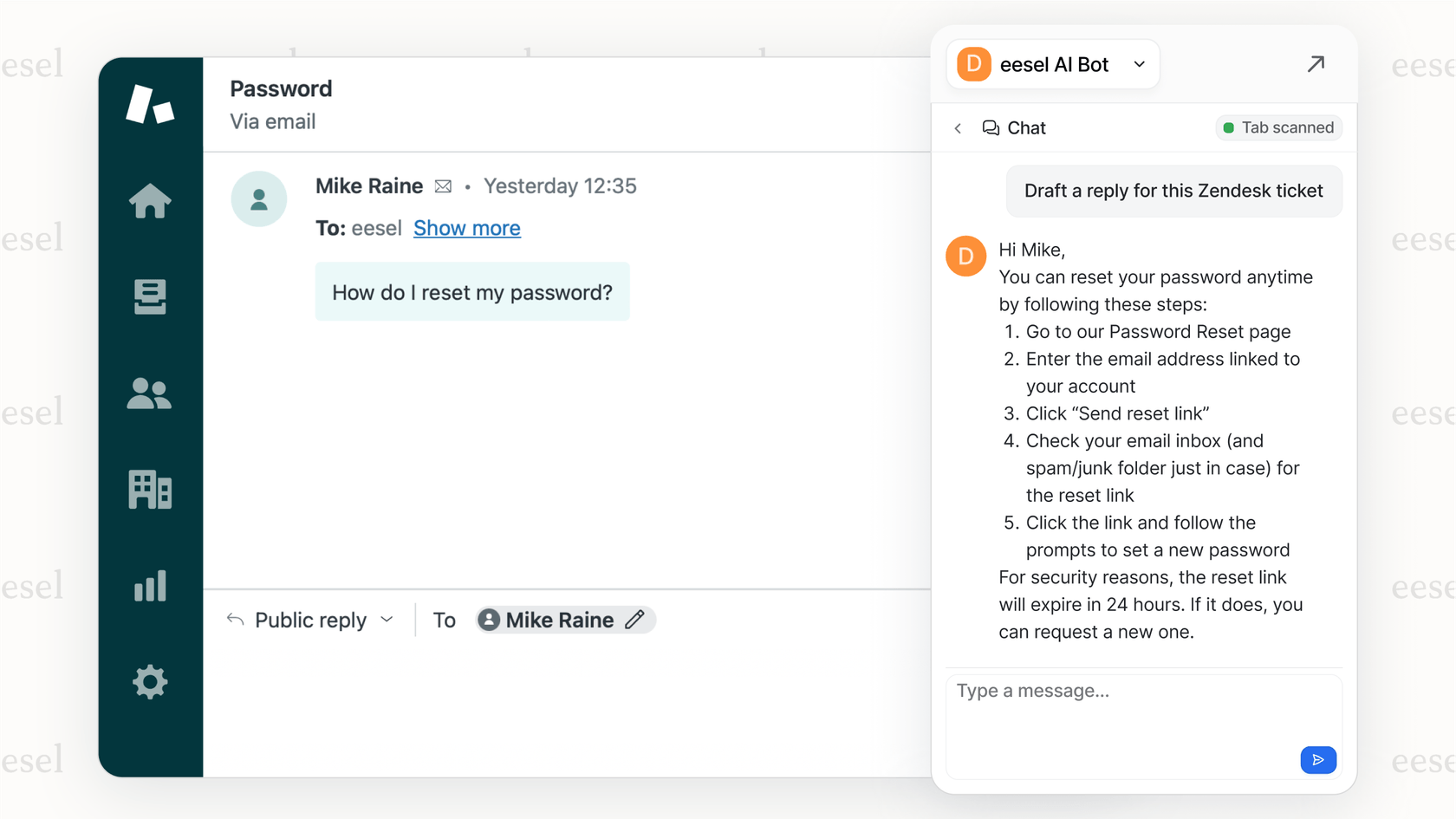
- Pros: It fits right into your help desk, keeping your tone of voice consistent. Your data is never used to train general models, and it can automate actions beyond just writing, like organizing tickets.
- Cons: It's a specialized tool for businesses, so it's not meant for writing long marketing articles or creative stories.
- Pricing: Plans are based on how many AI interactions you use. The Team plan starts at $239 per month (billed annually) and covers up to 1,000 interactions.
2. Jasper
Jasper has been a popular choice in the marketing world for a while, mostly because it’s so versatile and has a huge library of templates. If you need ad copy, a social media post, or a blog post outline, Jasper probably has a template to get you started. Its Brand Voice feature also helps make sure the content matches your marketing style.
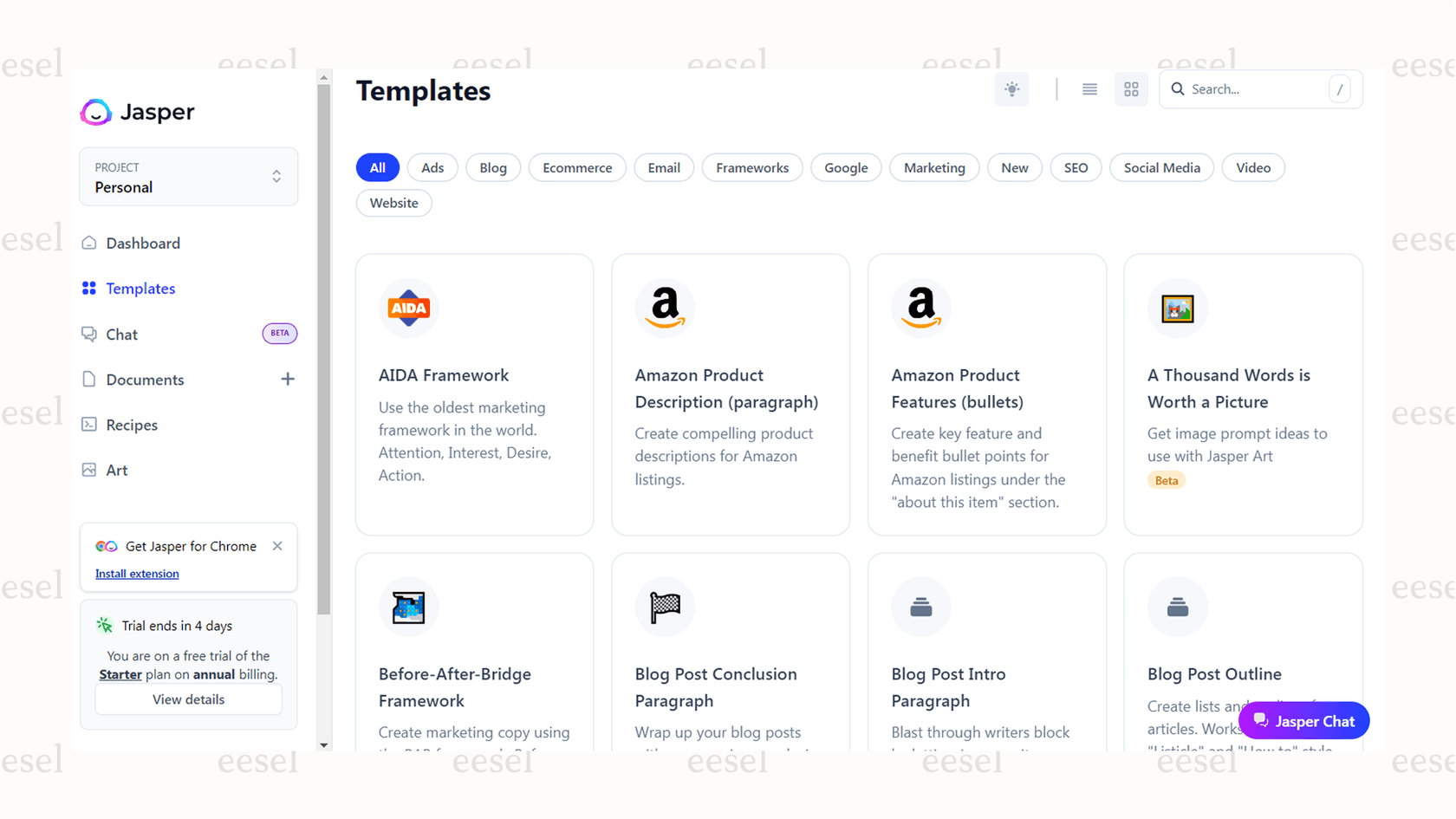
But while Jasper is great for creating new marketing materials, it’s a separate tool from your main business systems. For teams that need to write replies and updates from inside their help desk or chat tools, an integrated platform like eesel AI is built specifically for that kind of important work.
- Pricing: The Creator plan starts at $39 per month when billed annually.
3. Copy.ai
Copy.ai is a solid tool for go-to-market teams, especially in sales and marketing. Its main advantage is its workflow automation, which lets you generate entire email sequences or ad campaigns from a simple prompt. It’s designed to help you create a lot of copy quickly and speed up your outreach.
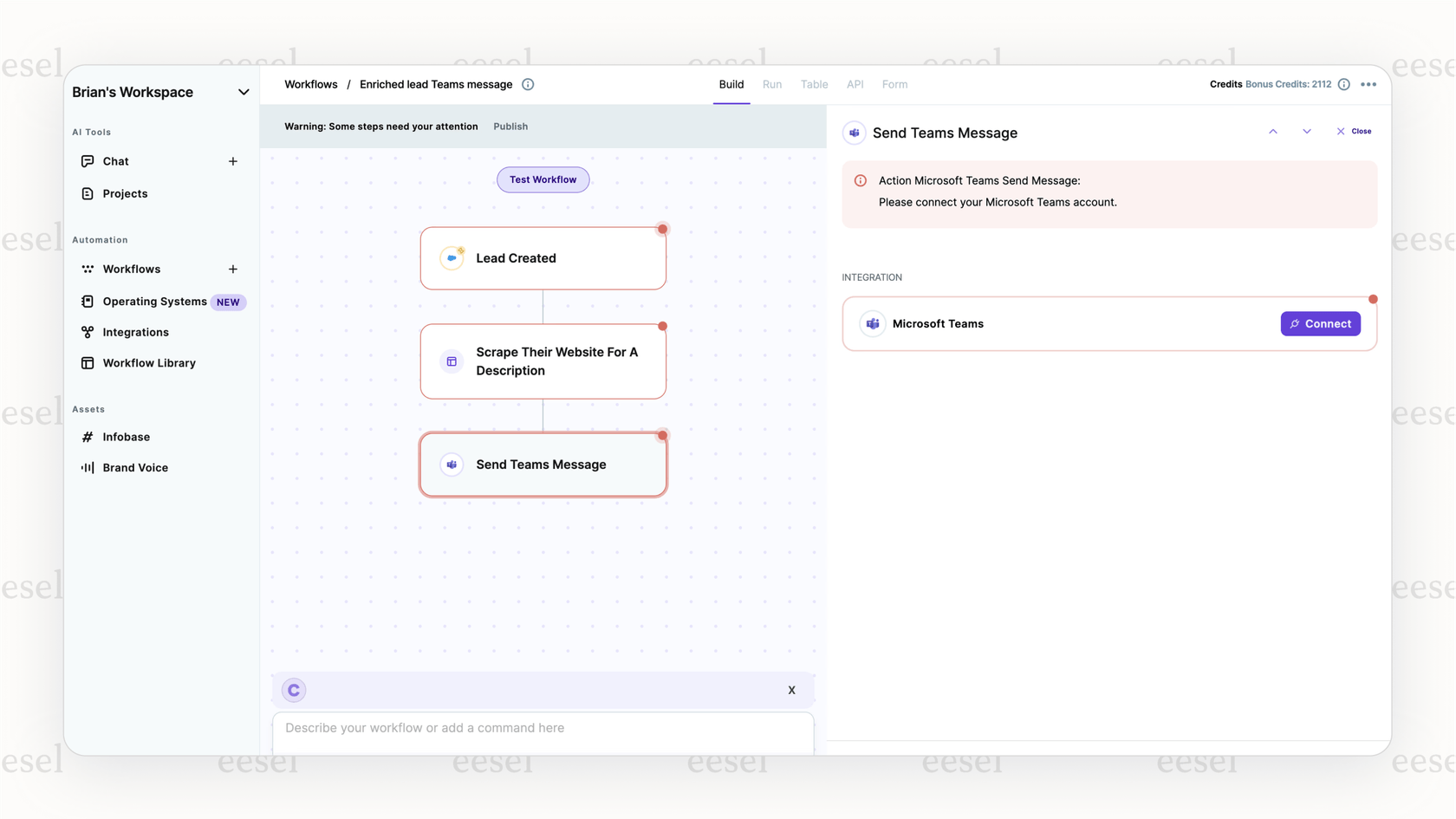
The workflows in Copy.ai are great for customer-facing campaigns. But for internal work, you need a different kind of automation. For instance, eesel AI’s AI Actions automate things within support and IT workflows, like automatically tagging a ticket, sending it to the right person, or checking a customer's order status from Shopify.
- Pricing: The Starter plan is $36 per month when billed annually.
4. Writesonic
If your content marketing depends on ranking high in search engines, Writesonic is a great option. It’s not just a writer; it’s an SEO sidekick. The platform has tools for keyword analysis and checking out what competitors are doing, helping you write articles that are not just well-written but also set up to do well on Google. Its AI Article Writer can create a full draft from just a few keywords, and its real-time content score helps you make improvements as you edit.
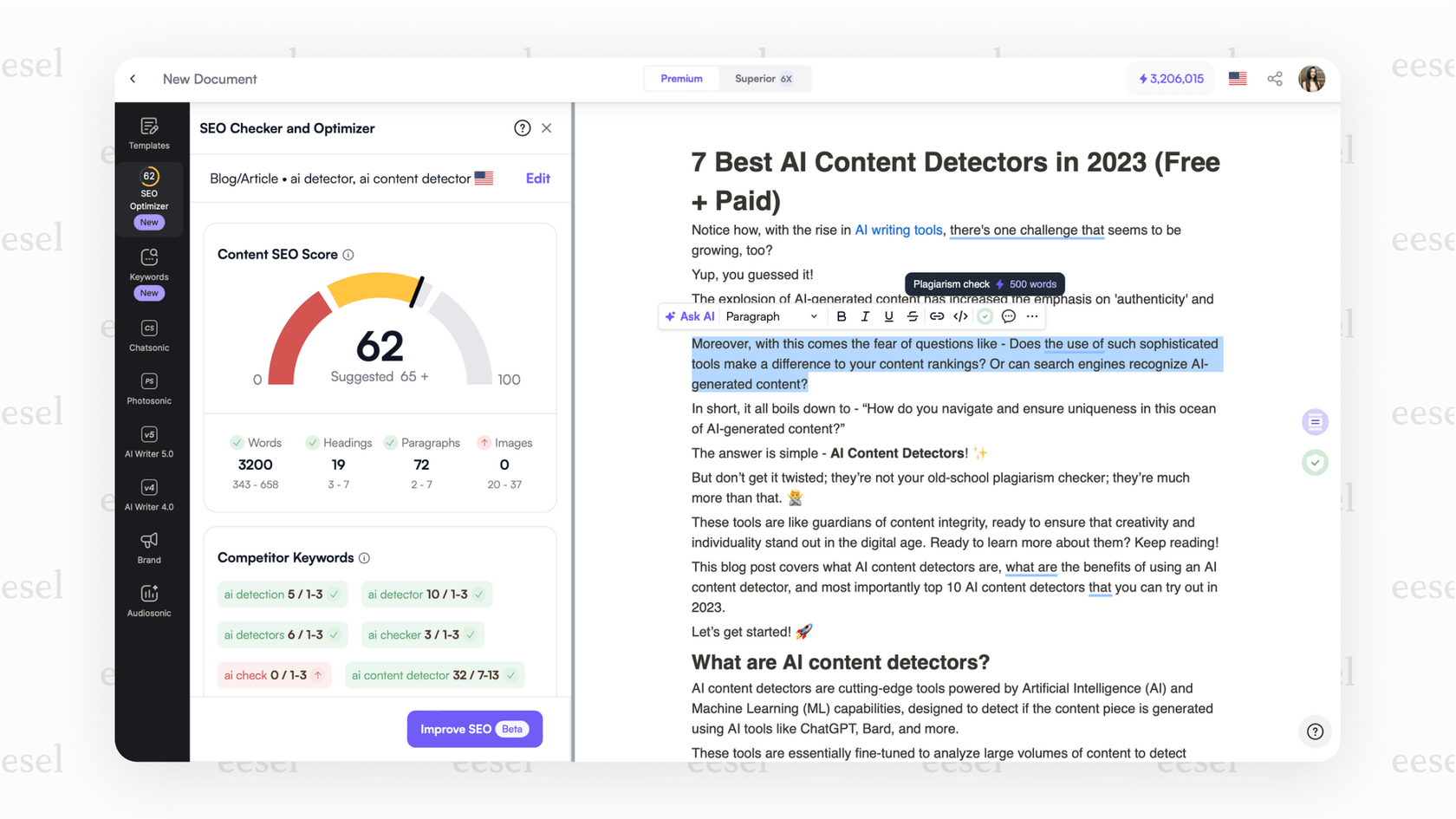
- Pricing: Individual plans start at an affordable $16 per month when billed annually.
5. ChatGPT Plus
You can't have a list of the best AI for writing without mentioning the tool that made AI a household name. ChatGPT is like the Swiss Army knife of AI writers. It can help you brainstorm, draft, code, and analyze data. A Plus subscription gives you access to the newest models, like GPT-4o, and lets you build custom GPTs for your specific tasks.
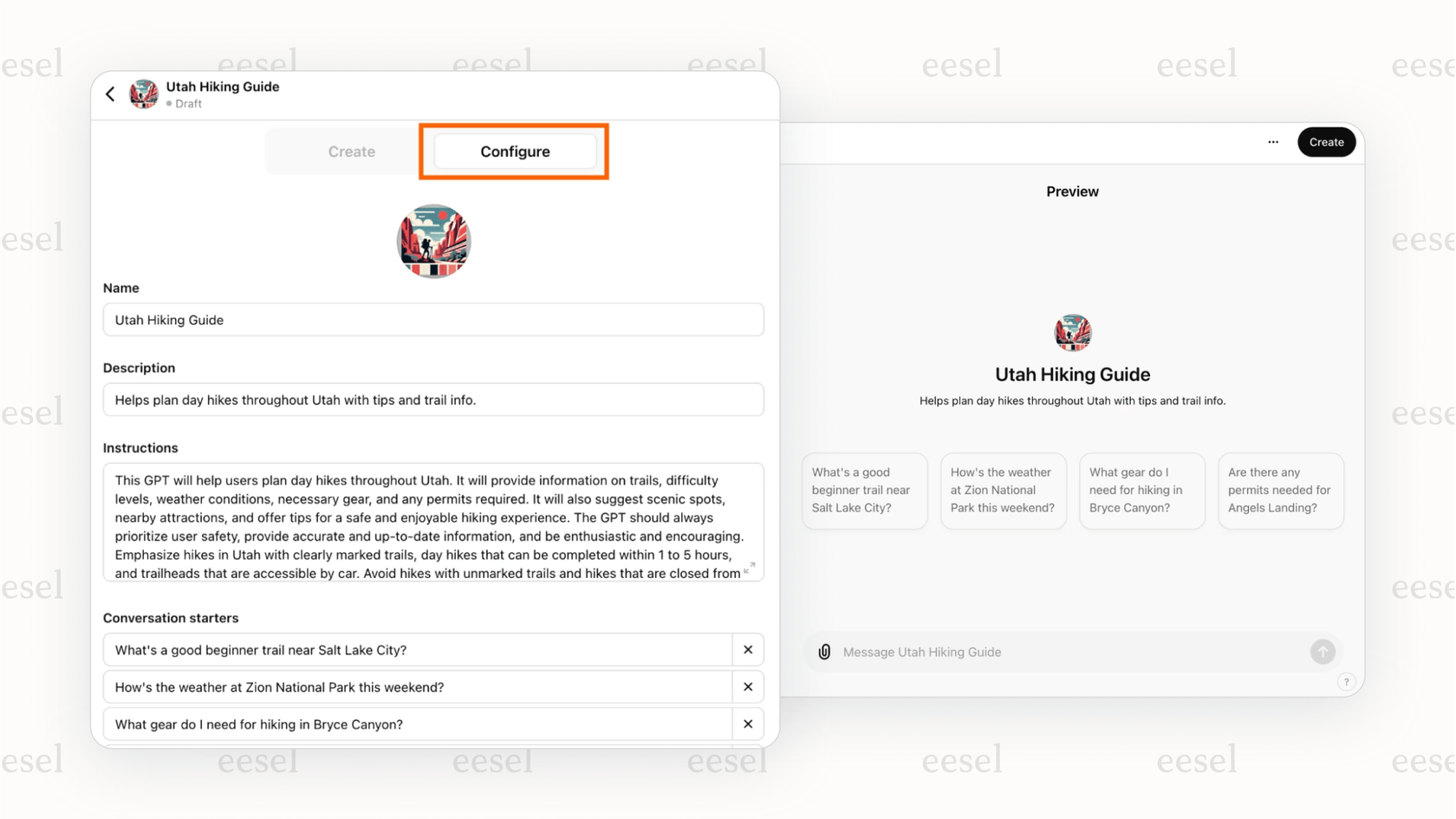
But being a jack-of-all-trades is also its biggest drawback for business teams. It runs in a separate browser tab and doesn't have the secure, direct integrations needed for important business work. Using it with sensitive company information is out of the question for most organizations. This is a problem solved by platforms like eesel AI’s AI Internal Chat, which gives you a secure, private Q&A assistant trained only on your company's documents.
- Pricing: The Plus plan is a flat $20 per month.
6. Claude
Claude has become a favorite for many writers because its writing style feels very natural and creative. It often produces text that sounds more human and less robotic than other models. Its best feature is its huge context window, which can handle up to 200,000 tokens (about 150,000 words). This makes it great for analyzing long documents, summarizing books, or keeping track of a very long conversation.
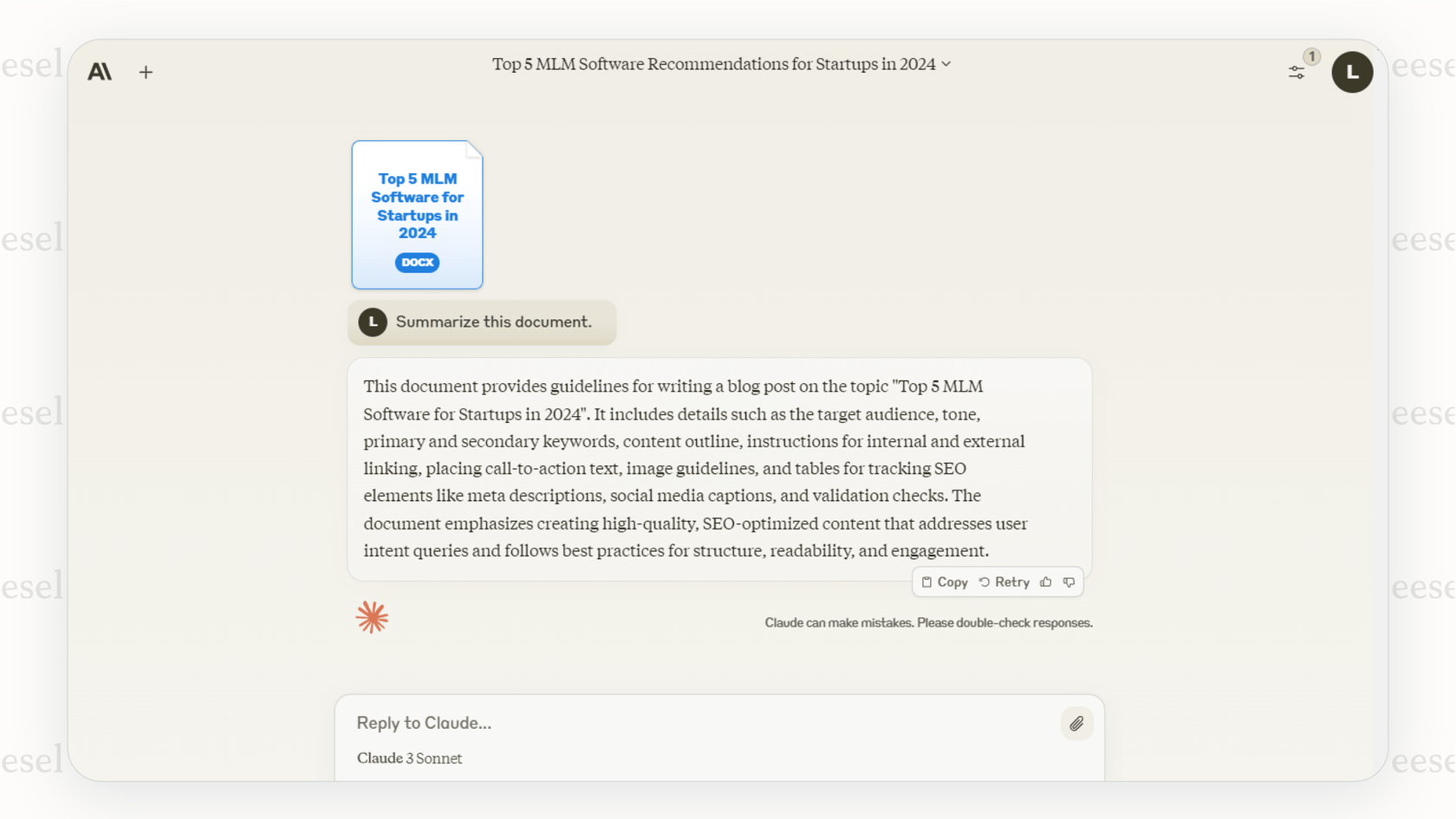
- Pricing: The Pro version starts at $17 per month when billed annually.
7. Frase
Frase is less of a writing tool and more of a content strategy tool. It really shines in the research and planning part of creating content. Before you write a single word, Frase looks at the top-ranking search results for your keyword and creates a detailed content brief. It tells you what topics to cover, what questions to answer, and which keywords to include so you can create content that's built to outrank your competitors.
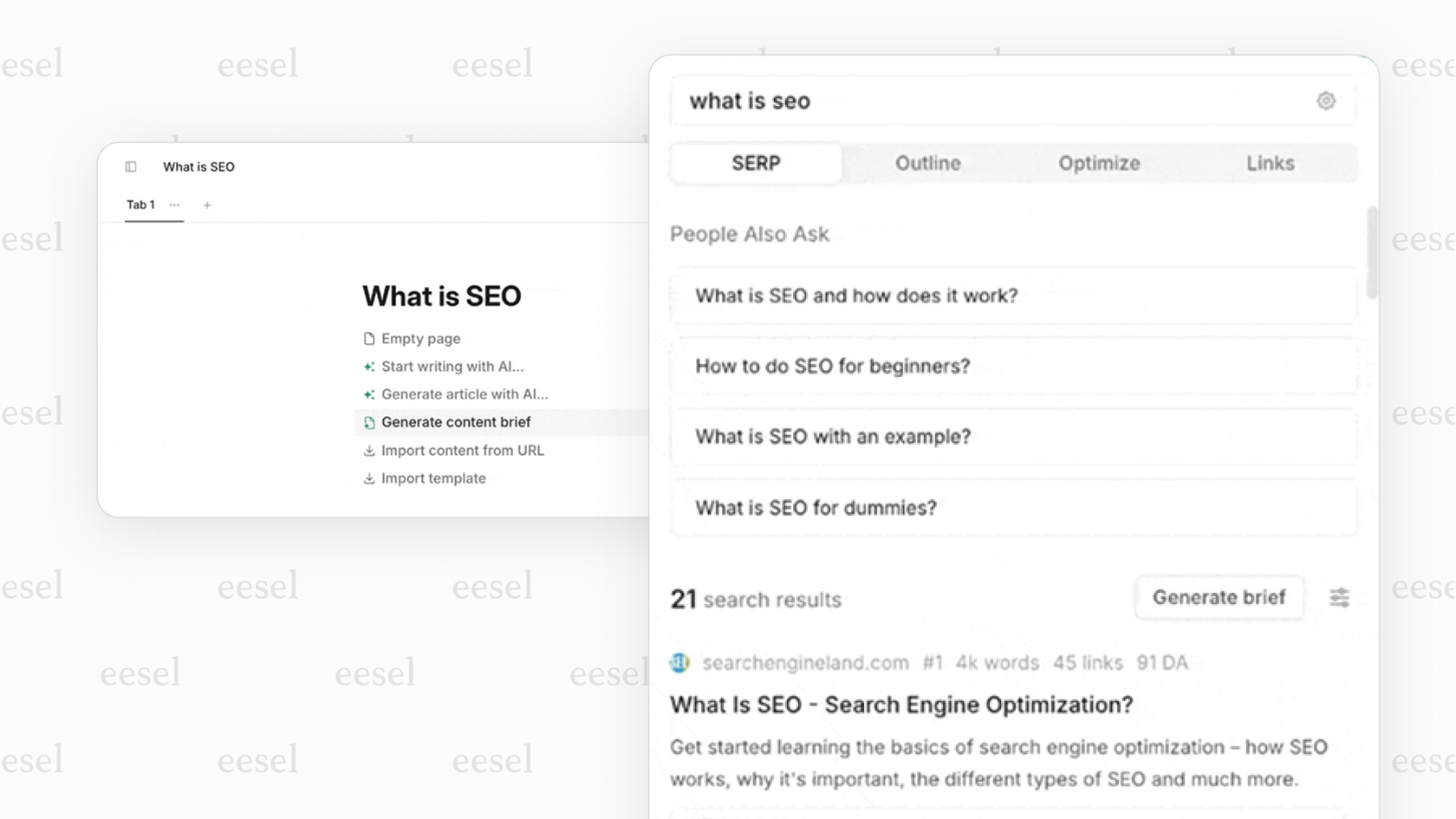
- Pricing: Plans start at $45 per month.
8. Rytr
If you’re new to AI writing or on a tight budget, Rytr is a great place to begin. It has a generous free plan that is perfect for casual use, and its paid plans are some of the most affordable you can find. The interface is clean and simple, with over 40 different use cases and more than 20 tones to choose from. This makes it super easy to generate quick bits of text for emails, social media, or product descriptions.
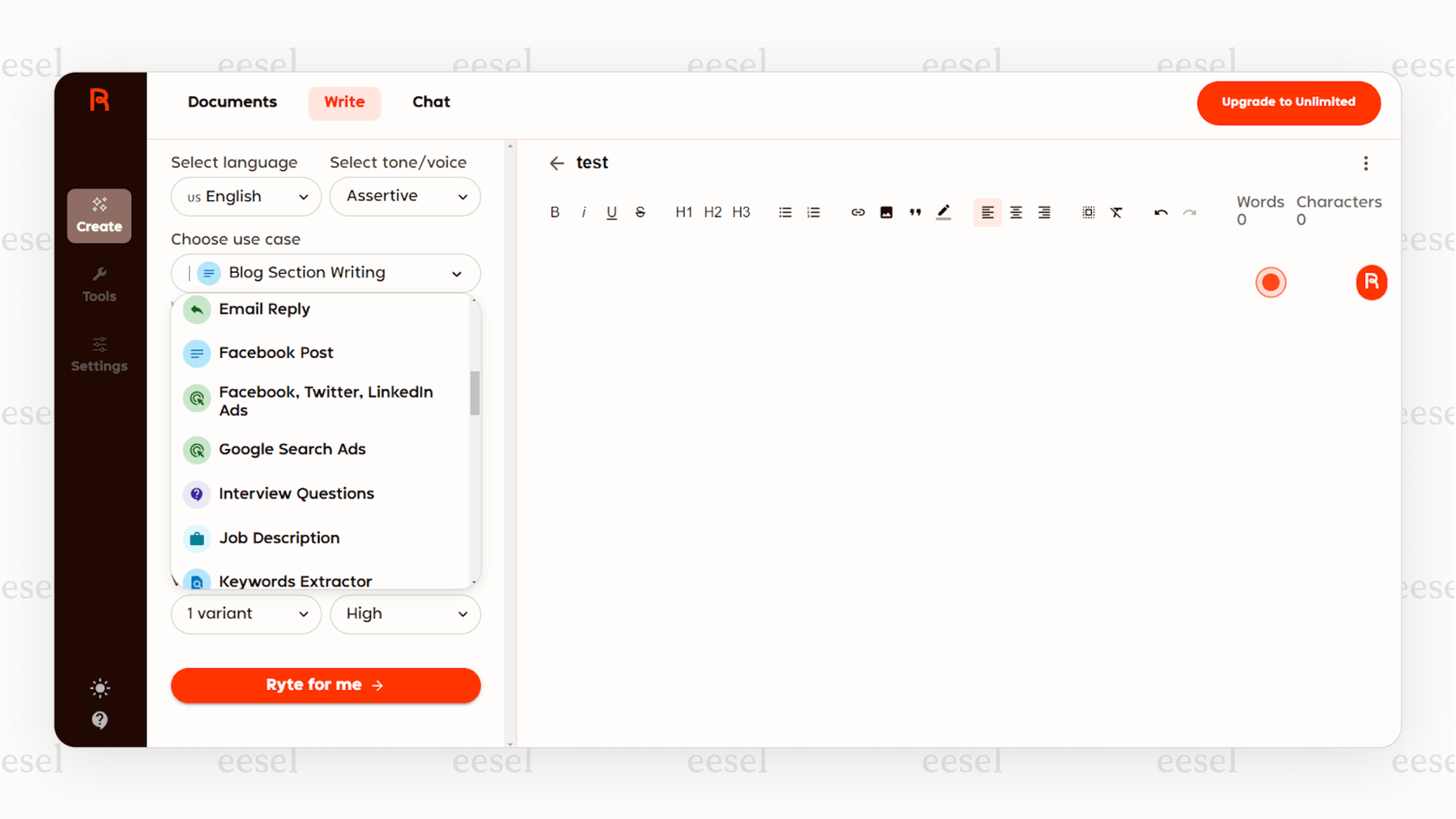
- Pricing: A free plan is available with a 10,000-character monthly limit. Paid plans start at just $7.50 per month when billed annually.
9. Duplichecker
DupliChecker is a complete writing and optimization platform. Designed for students, bloggers, and professionals alike, it offers a suite of AI-powered tools that help users write, edit, and refine their content with ease.
What makes DupliChecker stand out is its balance between simplicity and functionality. From paraphrasing content to checking for grammatical errors or ensuring originality, the platform provides all the essential tools under one roof. Its AI writing tools help generate content ideas, rephrase sentences, and polish drafts while maintaining the writer’s intended tone and style.
- Pricing: DupliChecker offers both free and premium versions. The majority of its tools are free, while premium subscriptions are available for the plagiarism checker, paraphrasing tool, and reverse image search, starting at just $5.
How to choose the best AI for writing for your needs
With so many choices, picking the right tool can feel tough. Here’s a simple way to think about it.
Start with your main use case to find the best AI for writing
First, ask yourself what you really need to write. Is your main goal to create marketing content like blogs and ads? Or are you trying to improve internal writing, like support tickets and knowledge base articles? General tools like Jasper or Writesonic are good for marketing, but specialized platforms are much better for internal tasks. If you want to make your support team faster and more consistent, you need a tool made for that job.
Prioritize workflow integration when choosing the best AI for writing
Think about the time you waste copying and pasting. The best AI for writing is the one that works where you already do. Constantly switching between your help desk and a separate AI tool is a drag and can lead to mistakes. This is where you see the difference between a standalone app and a tool that layers on top of your existing software, like eesel AI, which brings the AI assistant right into tools like Freshdesk or Microsoft Teams.
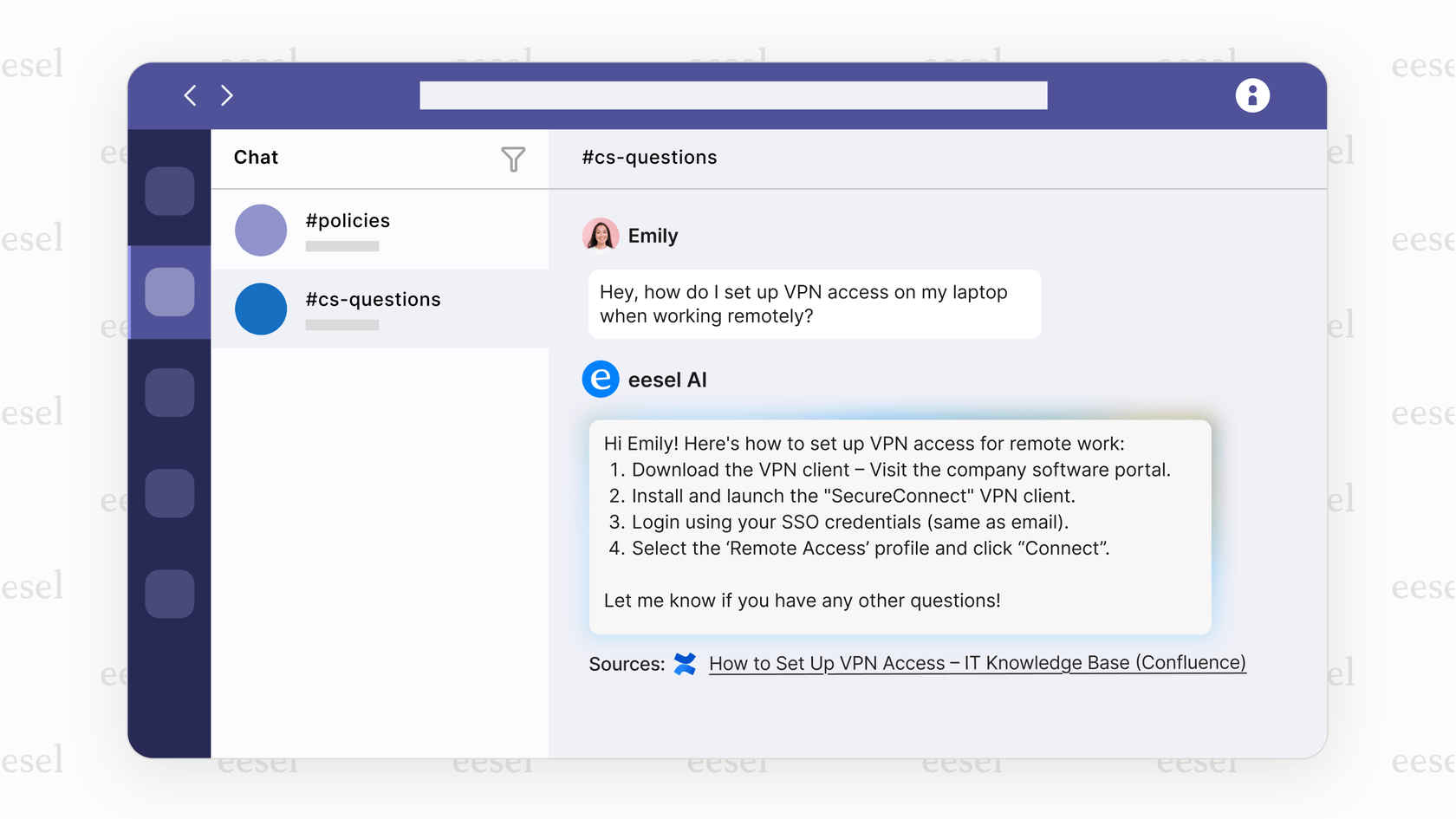
Look closely at security and training data for the best AI for writing
For any business, data privacy is a big deal. When you use a public AI tool, where does your information go? It's important to pick a platform with a clear security policy that protects your company’s information. A key difference with eesel AI is that it never uses your customer data to train its general models. Your information is used securely and only to train your own dedicated bots.
Look for automation beyond writing in the best AI for writing
The best AI tools don't just write they do things. An AI that can draft an email is helpful. An AI that can draft an email, tag the ticket, send it to the right team, and close it out is a true partner in your workflow. Look for tools that can take action, with eesel AI's Triage and Actions being a prime example of what’s possible.
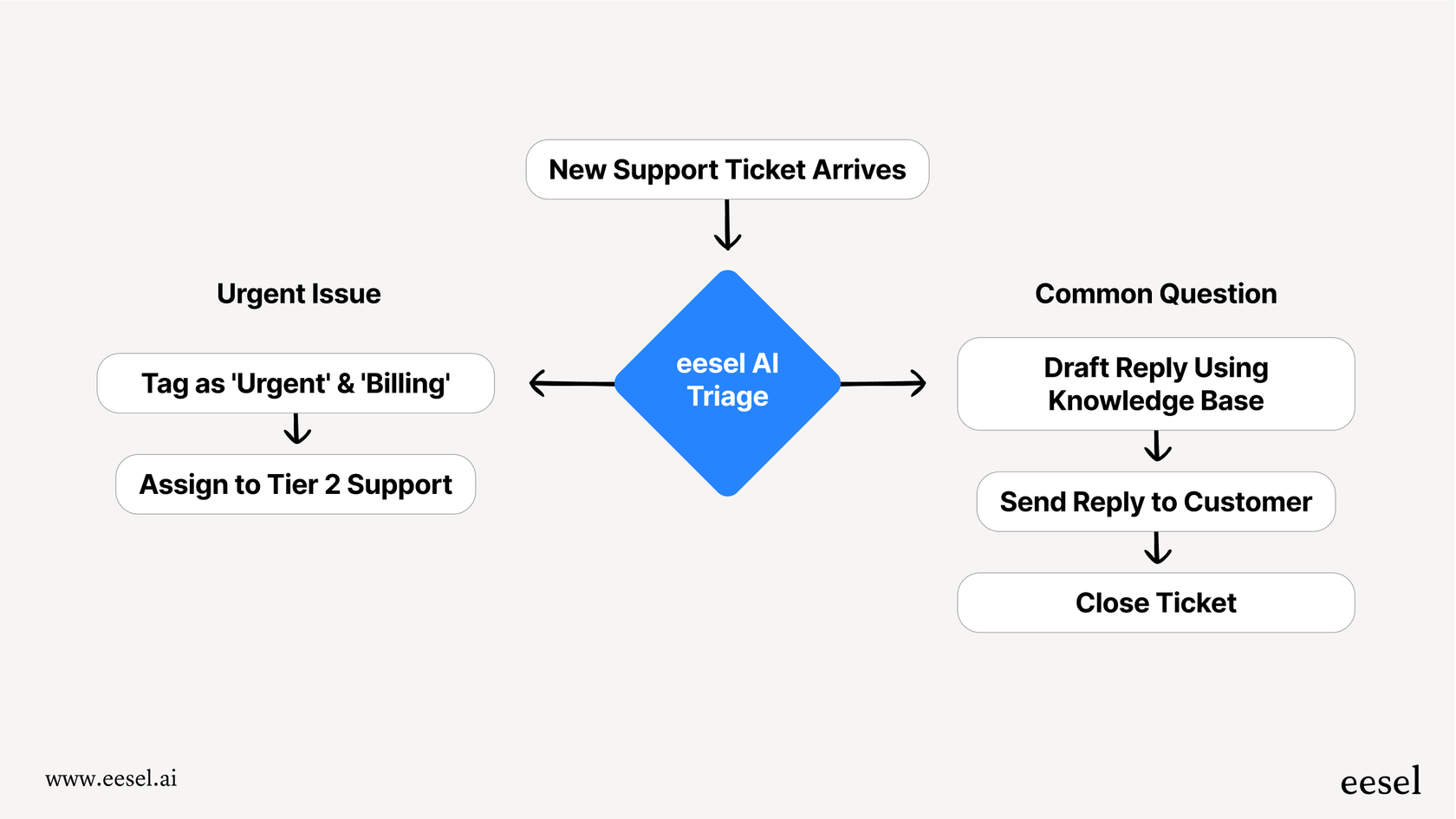
Transform your business writing with the best AI for writing
The "best AI for writing" isn't one single tool. It's the one that fits your workflow, meets your security needs, and helps you get your work done. For marketers, a general writing tool might be a perfect match. But for teams that depend on communication, like customer support, IT, and HR, a specialized, integrated platform makes a huge difference.
These tools don't just help you write faster; they help you communicate more effectively, consistently, and accurately. They take repetitive tasks off your team's plate so they can focus on the important work that people do best.
Ready to see how AI can write replies, draft emails, and automate tasks inside your existing tools? Book a demo of eesel AI today.
Frequently asked questions
The key is to match the tool to your primary task. For customer support, an integrated tool that learns from your help desk is ideal, while marketing teams benefit more from general content creators like Jasper or Writesonic for ads and blogs.
Always prioritize a business-grade platform with clear privacy policies that guarantee your data isn't used for public model training. A secure tool like eesel AI is designed for business, ensuring your company's information remains private and is used only for your dedicated AI.
Top-tier tools can learn and replicate your brand's style. Some analyze existing public content, while specialized platforms train directly on your team's past private messages to ensure every output sounds authentic and on-brand.
The most effective tools are those that work inside the apps you already use every day. Look for platforms that offer direct integrations into your help desk or chat tools, which eliminates time wasted copying and pasting between windows.
No, think of AI as a copilot, not a replacement. Its purpose is to handle repetitive drafting and research, which frees up your team to focus on the high-value work that requires human creativity, strategy, and critical thinking.
If you're on a tight budget, Rytr's free plan is a great starting point for short, simple tasks. For more powerful and versatile free options, the basic versions of ChatGPT and Claude are also excellent for general drafting and brainstorming.
Share this post

Article by
Stevia Putri
Stevia Putri is a marketing generalist at eesel AI, where she helps turn powerful AI tools into stories that resonate. She’s driven by curiosity, clarity, and the human side of technology.






